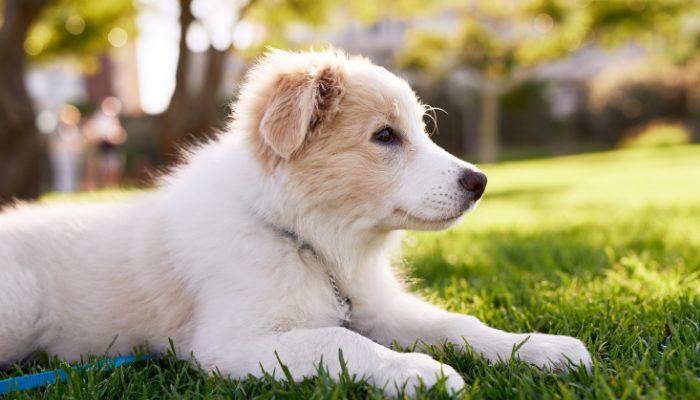The first week with a new puppy is often one of the most chaotic periods you'll experience. You might find yourself questioning what you've gotten into, but take heart—things will get better.
To say it's overwhelming is an understatement, yet focusing on a few key aspects initially can smooth the transition. From the significance of establishing a routine to laying the groundwork for potty training, here are 7 tips to help you survive the first week with your puppy.
Maintain a Calm Home Environment
When you first bring your puppy home, strive to keep the environment as calm as possible to let them settle in over the next few days.
While early socialization is commonly stressed, allowing your new puppy to slowly adjust to their new home and family can work wonders for their self-assurance. Being taken away from everything familiar is a huge shock to their system, so making things as relaxed and comfortable as possible will ease this transition.
If you have other pets, ensure introductions are slow and safe. Some animals may welcome the new puppy with excitement right away, while others might need time to get used to the new "member of the household."
Constant Supervision is Key
One of the simplest ways to prevent bad habits is to stop them before they start, so keeping a close eye on your new puppy during the first week is essential. They have no idea what's expected of them or what's off-limits, so it's your responsibility to teach them the basics.
If your puppy starts chewing on the rug, distract them with a toy instead and shower them with praise. Make that toy far more appealing than the rug, so they'll be more likely to choose the toy in the future.
Establish a Consistent Routine
Setting up a routine is one of the most crucial parts of helping your dog settle into their new home. Keep their bedtime, potty breaks, and meal times regular to make the transition into their new life easier for them.
Being in a completely new place with new people can be frightening, but teaching them what to expect at specific times through a routine will aid their adjustment.
Reward Positive Actions
Rewarding good behavior is one of the best strategies for training a well-behaved dog, and the first week with a new puppy is the ideal time to start. Young puppies may have short attention spans, but it's never too early to work on basics like rewarding good manners.
The more you praise certain behaviors, the more likely they are to repeat them later on, so don't forget to heap on the praise every time they do something right.
Begin Potty Training Fundamentals
If you stick to supervising your puppy at all times during the first week, you can make significant progress in potty training basics. The more often you can praise them for going potty outside, the quicker they'll associate outside with bathroom time.
While this might sound oversimplified, it's true: the positive reinforcement of going potty outside (all the praise you give them for peeing on the grass) will start to register, and they'll begin to understand that's where the bathroom is. By taking them out every hour or two, you can maintain the "every potty is a party" mindset they need to learn that going outside leads to good things.
And if you're following the "supervise your pup at all times" step, you'll be able to step in as soon as they start sniffing around indoors, a sign they might need to go out.
Start the Socialization Journey
Earlier, I mentioned keeping your house calm during the first week, but that doesn't mean avoiding all social interactions. Having a few people over to help your puppy get used to visitors is a great way to start their socialization.
It also teaches them that having people over isn't something to fear and that they can still feel safe at home even with unexpected events. If you've ever had a dog that gets scared when visitors arrive or maintenance work is done, you'll understand—getting them used to unexpected visits can reduce that anxiety.
After the first week, you might consider enrolling them in a puppy socialization class, which is excellent for teaching your dog not only to get along with others but also to focus in new environments.
Introduce Basic Obedience Training
Along with teaching your puppy their routine and potty schedule, it's a good time to introduce some basic obedience. Teaching them to sit is a perfect starting point: grab a treat, hold it above their head, and encourage them to sit down and look up at it.
During the first week, you can also start working on the basics of a good recall. The most important thing when teaching your dog to come when called is to make sure you're the source of all good and fun things. They'll be much more likely to run to you when you call if they know they'll get a nice belly rub or a treat.
Please share with your friends 🙂
